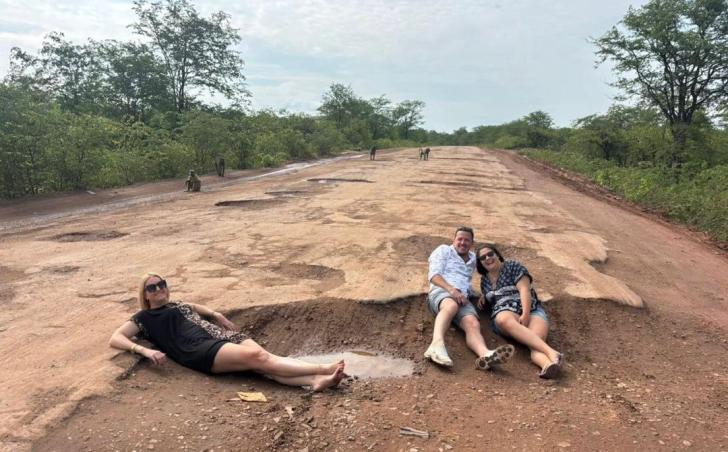News / Local
Detours are currently being constructed along Bulawayo - Victoria Falls Road
16 Jun 2025 at 13:38hrs |
0 Views

The Government has named five local contractors who have commenced work on the rehabilitation of the vital Bulawayo - Victoria Falls Road, a 435-kilometre highway crucial for tourism and regional trade in Zimbabwe. The Ministry of Transport and Infrastructural Development confirmed that detours are currently being constructed along the route to facilitate smooth traffic flow and enhance safety during the construction process.
According to the Ministry, the rehabilitation project is progressing steadily with the five contractors assigned to specific sections along the highway. Detours are being developed to ensure the safety of both motorists and construction workers while allowing the contractors to work efficiently without disrupting traffic. These detours also aim to guarantee that the upgraded road will be durable and built to last.
The contractors currently on site include Fossil Contracting, which is handling a 4-kilometre section near the 48.6-kilometre peg; Masimba Construction, working on a 5-kilometre stretch between the 85 and 90-kilometre marks; Syvern Investment, managing another 5-kilometre section between 99.6 and 104 kilometres; Bitumen Resources, clearing 4.2 kilometres from chainage 201.6km toward 191km; and Tensor Systems, responsible for a 5-kilometre area from 201.6km to 211.6km.
Last week, the Ministry further confirmed that detours have already been constructed in important locations such as Bernice, Cross Jotsholo, and Insuza in Matabeleland North Province. This strategic move is expected to improve the flow of traffic during the road works and minimize inconvenience to travelers.
Richard Moyo, the Matabeleland North Provincial Affairs and Devolution Minister, expressed his appreciation for the project, stating that out of eight applicants, five contractors were chosen to undertake this significant task. He also praised President Mnangagwa for prioritizing the highway, which he described as vital to the province's economy.
The entire rehabilitation project is expected to take approximately 10 months to complete. It will be carried out in phases, with each contractor working on designated sections in a coordinated kilometre-by-kilometre approach. The Bulawayo–Victoria Falls Road is a key national artery that links Zimbabwe with neighbouring countries including Zambia, Botswana, and Namibia. It serves thousands of domestic travelers and international tourists annually and is essential for transporting goods from mining and agricultural areas in the northwestern part of the country.
In recent years, the road has been plagued by potholes, narrow lanes, and eroded shoulders, raising safety concerns and hampering economic activities in the region. Under the Emergency Road Rehabilitation Programme Phase 2 (ERRP2), the government has made infrastructure development a priority, rehabilitating more than 50,000 kilometres of roads and attending to 2,000 related structures since 2021.
Despite challenges such as limited access to external financing, the government continues to invest heavily in road infrastructure as a key driver of economic growth, job creation, and improved living standards for Zimbabweans. In addition to road upgrades, new equipment including tractors has been procured to revitalize road maintenance units across the country. Plans are also underway to establish asphalt plants nationwide to support ongoing infrastructure development and maintenance.
These efforts reflect the government's commitment to transforming Zimbabwe into an upper-middle-income economy by 2030, recognizing that well-maintained road infrastructure is essential for sustainable development and regional integration.
According to the Ministry, the rehabilitation project is progressing steadily with the five contractors assigned to specific sections along the highway. Detours are being developed to ensure the safety of both motorists and construction workers while allowing the contractors to work efficiently without disrupting traffic. These detours also aim to guarantee that the upgraded road will be durable and built to last.
The contractors currently on site include Fossil Contracting, which is handling a 4-kilometre section near the 48.6-kilometre peg; Masimba Construction, working on a 5-kilometre stretch between the 85 and 90-kilometre marks; Syvern Investment, managing another 5-kilometre section between 99.6 and 104 kilometres; Bitumen Resources, clearing 4.2 kilometres from chainage 201.6km toward 191km; and Tensor Systems, responsible for a 5-kilometre area from 201.6km to 211.6km.
Last week, the Ministry further confirmed that detours have already been constructed in important locations such as Bernice, Cross Jotsholo, and Insuza in Matabeleland North Province. This strategic move is expected to improve the flow of traffic during the road works and minimize inconvenience to travelers.
The entire rehabilitation project is expected to take approximately 10 months to complete. It will be carried out in phases, with each contractor working on designated sections in a coordinated kilometre-by-kilometre approach. The Bulawayo–Victoria Falls Road is a key national artery that links Zimbabwe with neighbouring countries including Zambia, Botswana, and Namibia. It serves thousands of domestic travelers and international tourists annually and is essential for transporting goods from mining and agricultural areas in the northwestern part of the country.
In recent years, the road has been plagued by potholes, narrow lanes, and eroded shoulders, raising safety concerns and hampering economic activities in the region. Under the Emergency Road Rehabilitation Programme Phase 2 (ERRP2), the government has made infrastructure development a priority, rehabilitating more than 50,000 kilometres of roads and attending to 2,000 related structures since 2021.
Despite challenges such as limited access to external financing, the government continues to invest heavily in road infrastructure as a key driver of economic growth, job creation, and improved living standards for Zimbabweans. In addition to road upgrades, new equipment including tractors has been procured to revitalize road maintenance units across the country. Plans are also underway to establish asphalt plants nationwide to support ongoing infrastructure development and maintenance.
These efforts reflect the government's commitment to transforming Zimbabwe into an upper-middle-income economy by 2030, recognizing that well-maintained road infrastructure is essential for sustainable development and regional integration.
Source - The Herald
Join the discussion
Loading comments…





























